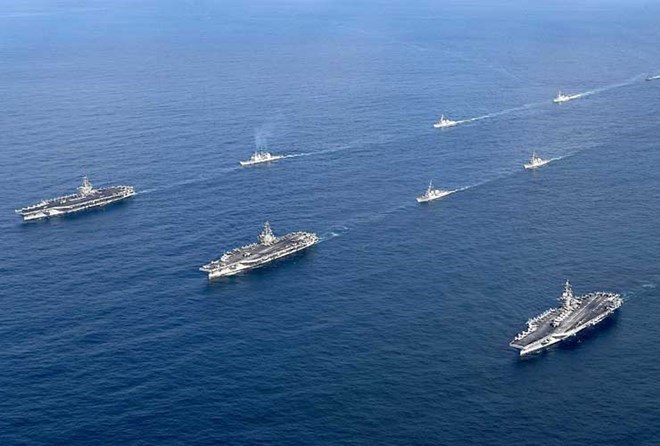
The Indonesian government and the United Nations (UN) co-hosted the first training conference on the Law of the Sea in Jakarta from December 12-14, including the 1982 UN Convention on the Law of the Sea (UNCLOS).

Illustrative image (Source:
VNA)
The event was meant to implement the
action plan for the ASEAN-UN joint Declaration on Comprehensive Partnership for
2016-2020 and build capacity via legal and technical training on the Law of the
Sea, particularly the 1982 UNCLOS.
Speaking at the event, Vice Ambassador of Germany to Indonesia Hendrik
Barkeling expressed Germany’s
stance on abiding by the 1982 UNCLOS, adding that Germanyand the European Union have worked closely with the ASEAN member states to
maintain peace and maritime freedom in the East Sea.
He expressed his hope that countries concerned would peacefully settle disputes
in line with international law.
Hikarico from the Japanese Delegation to ASEAN reiterated Prime Minister Shinzo
Abe’s statement in 2014 that the settlement of disputes in the East Seashould comply with the 1982 UNCLOS. Countries involved should clearly determine
their baselines in line with international law, refrain from the use of force,
and join negotiations to settle disputes, as well as seek long-term solutions
to maintain peace and stability in the East Sea.
During the three-day event, delegates will hear reports and discuss the UNCLOS,
its relation to the implementation of the UN Agenda 2030 for Sustainable
Development, rights and obligations to maritime security and safety, marine
environment and maritime biodiversity, dispute settlement, and more.
Source: VNA
The first summit between the European Union (EU) and the Gulf Cooperation Council (GCC) in Brussels, Belgium, marked an important step forward in their bilateral relations.
The 45th General Assembly of the ASEAN Inter-Parliamentary Assembly (AIPA-45) opened in Vientiane on October 19.
Many countries are grappling with rapidly aging population. As population aging becomes an irreversible global trend with significant impacts on economic and social sectors, nations face the urgent task of creating flexible policies to adapt to and make the most of this trend to build prosperous and sustainable societies.
With a series of stimulus measures, the world tourism industry is on the way to recovery as before the COVID-19 pandemic broke out. Facing the opportunity to take off, the "smokeless industry” is expected to strongly contribute to global economic growth while promoting potential and cohesion, contributing to peace and sustainable development.
The danger from the COVID-19 pandemic is still latent, threatening people’s health and lives in the context that the immunity provided from the COVID-19 vaccine has decreased. Many other dangerous diseases are also likely to break out when the global vaccination rate slows down, due to inequality in access to health services, vaccine hesitancy, and consequences of economic recession.
The Association of Southeast Asian Nations (ASEAN) is witnessing a rise in the sales of electric vehicles (EVs) in Vietnam, Malaysia and Indonesia, according to Maybank Investment Bank Research (Maybank IB Research).



